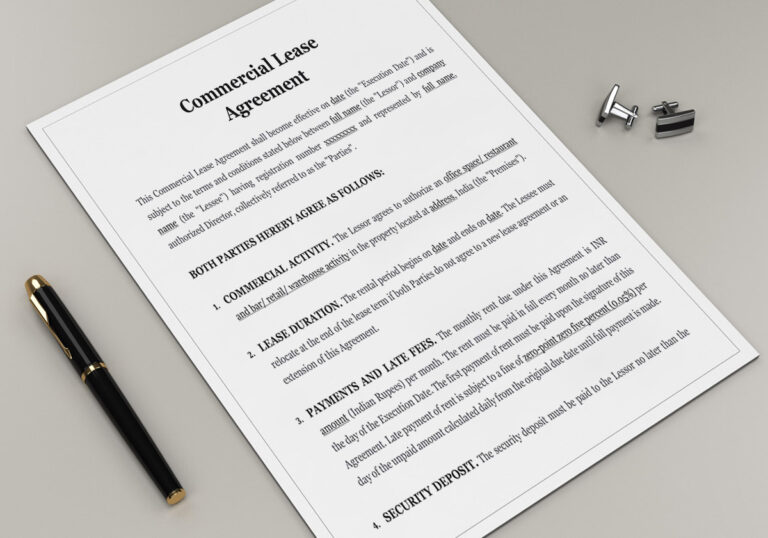What Documents Are Required for Office Leasing in Vietnam?
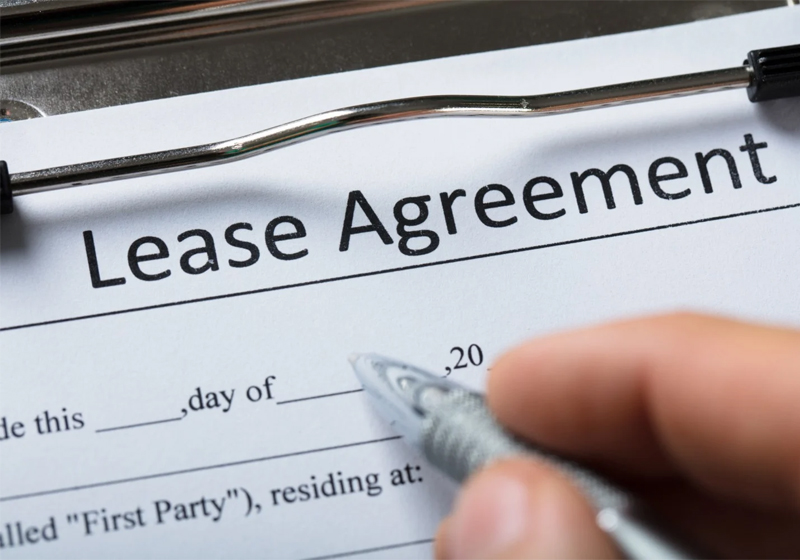
When leasing an office in Vietnam, businesses must prepare several essential documents to comply with legal regulations and ensure a smooth rental process. Documents required for leasing office in Vietnam are crucial for both local and foreign businesses to complete legal procedures and avoid future disputes. Having all necessary documents ready not only speeds up the contract signing but also helps protect the rights and obligations of both parties involved.
>> See more: Office Space Lease Agreement Template in VietNam
Table of Contents
1. Documents Required from the Tenant (Lessee)
To ensure the legality of office lease transactions, both the tenant and the landlord must provide valid documents in accordance with Vietnam office lease requirements set by the State. So, what documents are required for office leasing in Vietnam?
For the tenant, the documents required will depend on the type of legal entity such as:
– Vietnamese companies
– Foreign-invested Companies (FDI)

>> See more: FDI Company in Vietnam: Opportunities for Foreign Investors
1.1 Vietnamese Companies
For Vietnamese companies leasing office space, the following documents are typically required, as stipulated under the Law on Enterprises (Law No. 59/2020/QH14):
– Business Registration Certificate (BRC): A notarized copy of the certificate showing the company’s name, registered address, and business activities. This document confirms the legal status of the entity when entering into a lease agreement.
– Identification of the legal representative (ID card/Citizen ID/Passport): Used for identity verification during contract signing.
– Authorization letter or power of attorney: If the signer is not the legal representative and must be accompanied by the identification of the authorized person.
– Official letter requesting to sign an office lease contract: For large companies with internal procedures, applicable to enterprises with strict legal and accounting control processes.
– Company seal sample (if the contract requires stamping): Needed to complete the lease contract and payment procedures.
These documents confirm the company’s legal status and authority to enter into lease agreements.
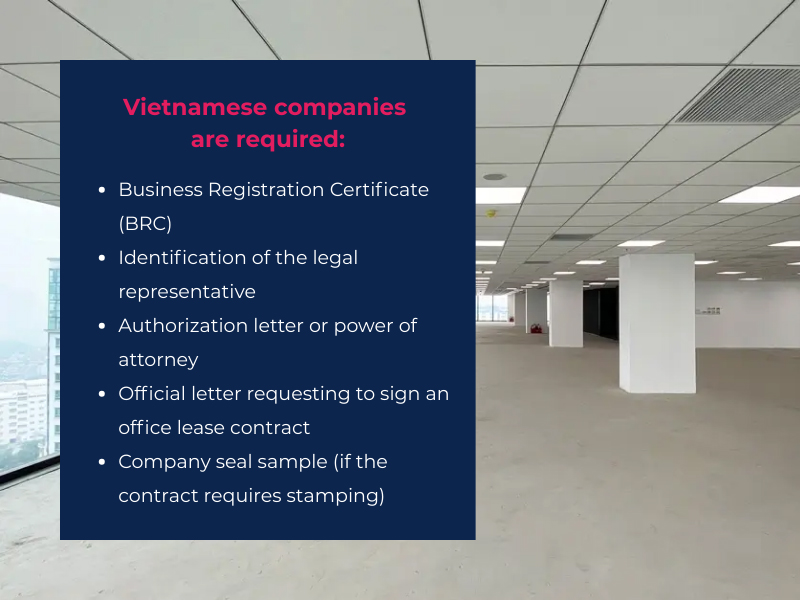
Note: In cases where the business has not yet obtained a business license, some buildings may offer flexibility by allowing the lease contract to be signed under an individual’s name first. This contract can then be used to register the business license using the building’s address. Once the license is issued, the lease agreement can be updated to reflect the company’s legal entity.
1.2 Foreign-invested Companies (FDI)
Foreign-invested companies (FDIs) must submit additional documents reflecting their foreign ownership and compliance with Vietnam’s regulations, as stipulated in the Law on Investment (Law No. 61/2020/QH14) and the Law on Enterprises (Law No. 59/2020/QH14). The required office rental documents in Vietnam include:
– Investment Registration Certificate (IRC): A notarized copy of the IRC, issued under Article 38 of the Law on Investment, detailing the scope of the investment project, capital contribution, and foreign investors.
– Enterprise Registration Certificate (ERC): Confirms the company’s official business registration and legal establishment in Vietnam.
– Legal Representative’s Identification: A notarized copy of the passport or ID card of the legal representative.
– Power of attorney: If the lease is signed by an authorized representative, a power of attorney and the signatory’s identification documents are required, consistent with the Civil Code (Law No. 91/2015/QH13).
– Tax code certificate and seal (if applicable): Used to confirm the company’s tax registration status and to complete official contract signing procedures when required.
– Official request letter for office lease: The original document with the company’s seal (if available).
Note on consular legalization and translation:
– For documents issued by competent authorities abroad (e.g., the business registration certificate of a foreign parent company), consular legalization must be carried out at the Vietnamese diplomatic mission in that country or at the foreign diplomatic mission in Vietnam (Decree No. 111/2011/NĐ-CP).
– All documents in foreign languages must be notarized and translated into Vietnamese by an authorized translation organization in Vietnam (Decree No. 23/2015/ND-CP).
>> See more:
– Vietnam IRC: Step-by-Step Guide for Foreign Investors
– Company Registration in Vietnam: Step-by-Step Guide 2026
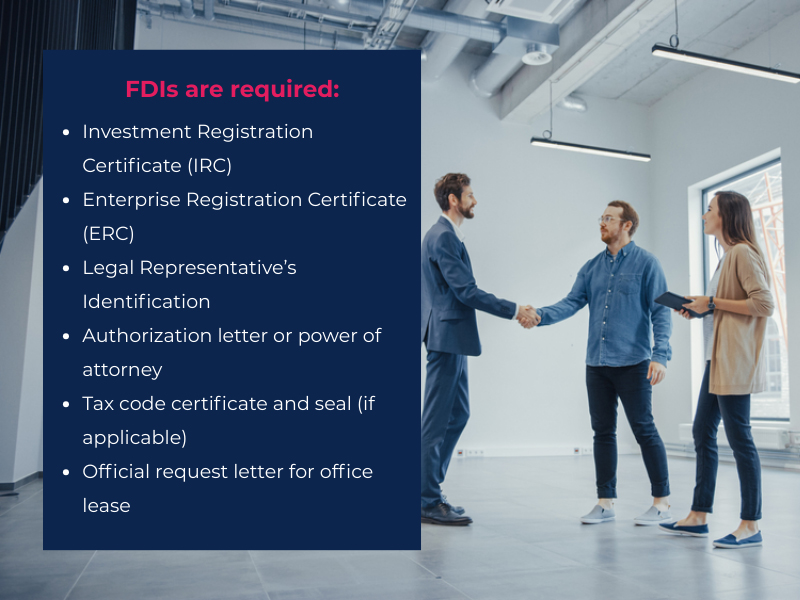
1.3 Representative Offices
For representative offices, documents required for leasing office in Vietnam typically consist of establishment licenses and identification of legal representatives. Specifically, these include:
– Establishment License of the Representative Office: Issued by the relevant Vietnamese authority (usually the Ministry of Industry and Trade).
– Appointment Letter: A letter from the parent company appointing the chief representative of the representative office, specifying their authority.
– Identification of the Chief Representative: A notarized copy of the passport or ID card of the chief representative.
– Power of attorney (if applicable): If the lease contract is signed by an authorized person instead of the legal representative.
Note: Documents issued by foreign authorities (such as the appointment letter) must be consular legalized by the Vietnamese diplomatic mission abroad or the foreign mission in Vietnam and translated into Vietnamese by an authorized translation agency.
2. Additional Documents During Lease Process
Depending on the company’s size, business sector, and the landlord’s specific requirements, additional documents may be requested. These documents may include:
– Additional operation licenses (if applicable): For certain conditional business sectors (e.g., healthcare, education), subsidiary licenses must be provided in accordance with the Investment Law 2020 (Law No. 61/2020/QH14) to prove that the leased premises are used for the intended purpose.
– Most recent financial report: A copy of the audited financial statements (if available), in accordance with the Accounting Law 2015 (Law No. 88/2015/QH13), to help the landlord assess the financial capacity of the company.
– Usage plan: Some landlords may require a document describing the intended use of the premises (e.g., office, retail store, representative office) to ensure compliance with legal regulations and local zoning plans.
– Board of Directors’ or Parent Company’s Resolution: For high-value lease agreements, an approval decision from the Board of Directors or the parent company must be provided.
– Bank Reference Letter: It is often requested by landlords during office lease negotiations to assess the tenant’s ability to meet rental payment obligations.

>> See more: Vietnam Company Tax Rate: Corporate Tax, VAT, Iincentives
3. Documents Required from the Landlord (Lessor)
When leasing office space in Vietnam, not only the tenant but also the landlord must provide a set of legally required documents. These documents verify ownership rights, construction legality, and the landlord’s authority to lease the premises. The proper and complete preparation of these documents is the first step toward establishing a transparent and legally compliant lease transaction, minimizing legal risks for both parties.
Below are the essential office rental documents in Vietnam that the landlord (lessor) is required to provide, categorized by specific cases:
– Individual as the Landlord
– Company or Organization as the Landlord
– Special Case: Subleased Property
3.1 Individual as the Landlord
When the landlord is an individual, the following documents are typically required to verify ownership and ensure the legality of the lease. These typically include:
– Certificate of land use rights, ownership of houses and other assets attached to the land: Confirmation of the landlord’s ownership or lawful right to use the property.
– Personal identification documents: A certified copy of the ID card or passport of the property owner.
– Power of attorney: If the landlord authorizes another person to sign the lease, a power of attorney along with the authorized person’s ID must be provided.
– Construction permit: To confirm that the construction on the land is legally built, especially for commercial or office spaces.
– Office lease agreement: A formal contract outlining the rental terms between the individual landlord and the tenant.
These documents together form the essential legal basis to conduct a secure and transparent office leasing process with an individual landlord.
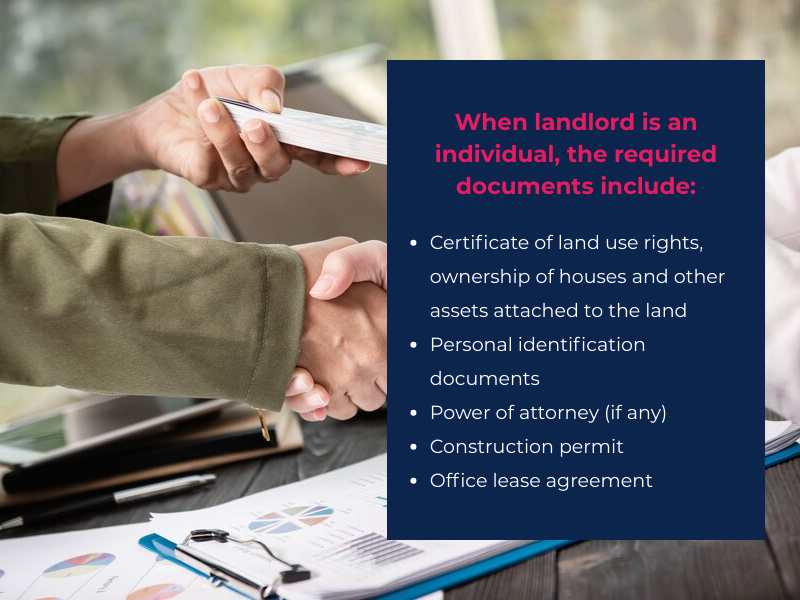
3.2 Company or Organization as the Landlord
When the landlord is a company or organization (including Vietnamese enterprises and Foreign-invested companies), the required documents include:
– Certificate of land use rights, ownership of houses and other assets attached to the land: Confirms legal ownership or usage rights of the property.
– Construction permit: Certifies that the building was legally constructed and is approved for use as office space.
– Completion certificate: Confirms that the building has been constructed in accordance with the construction permit and technical regulations.
– Business registration certificate: Demonstrates the lessor’s legal status and capacity to enter into lease agreements.
– Fire safety certificate: Mandatory for office buildings with 5 floors or more or large floor areas.
– Power of attorney (if signing on behalf of the owner): A legal document proving the signer has the lawful authority to represent the owner.
– Office lease agreement: A detailed contract between the building owner and the tenant outlining terms such as rental price, lease duration, and office usage.
– Brokerage authorization documents: Consulting and brokerage units such as Maison Office must have a cooperation agreement or an introduction letter from the building owner to ensure legitimacy.
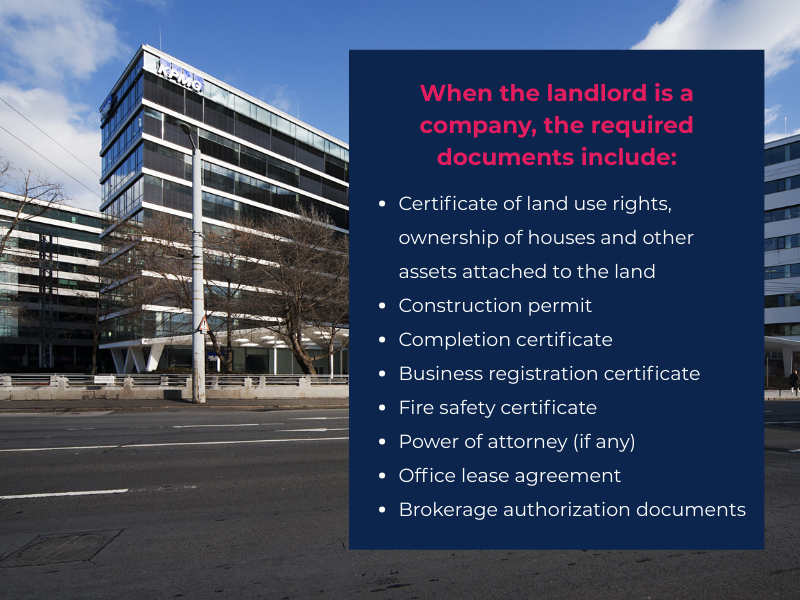
3.3 Special Case: Subleased Property
In cases where the office space is subleased, additional documents are required to verify the legal rights of the sublessor. These typically include:
– Original lease agreement: A copy of the original lease between the sublessor and the property owner, confirming the legal right to use the space.
– Consent letter from the property owner: Written approval from the owner allowing subleasing, unless the original lease already grants this right.
– If the sublessor is an individual:
– Certified copy of personal identification (ID card, passport)
– Power of attorney (if another person signs on behalf of the sublessor)
– If the sublessor is a company:
– Business Registration Certificate (BRC)
– Personal identification of the legal representative.
– Power of attorney (if the contract is signed by someone other than the legal representative).
– Official company seal or seal sample (if required by the lease agreement).
– Office lease agreement: A detailed contract between the sublessor and the tenant.
These documents are part of the standard office rental documents Vietnam and help confirm the sublessor’s legal status and signing authority.
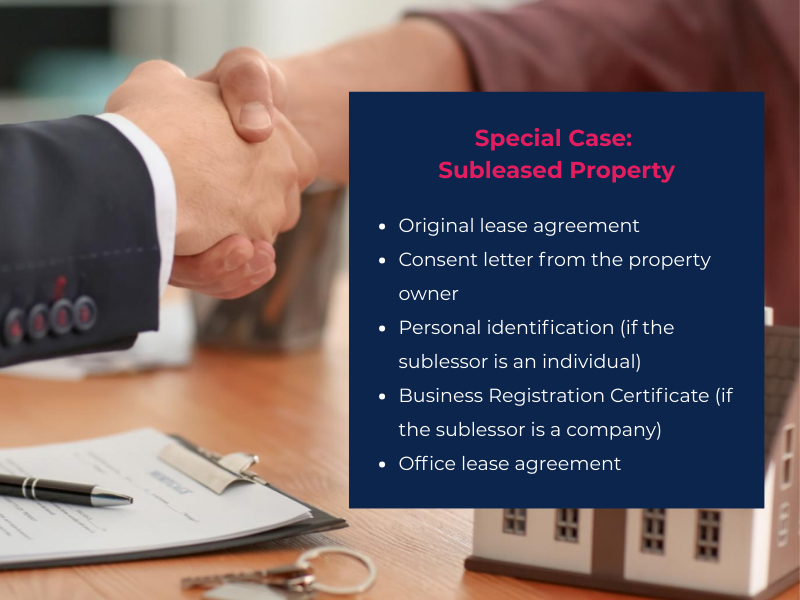
Note:
– The documents provided must be valid, not expired or revoked.
– Some documents require notarization or authentication according to regulations to ensure legal validity.
– Information on the documents must be consistent and match the office lease contract (e.g., company name, address, representative).
– The office lease agreement must be notarized if the lease term exceeds 6 months (according to Article 124 of the 2014 Housing Law No. 65/2014/QH13).
– To avoid disputes or errors, it is recommended to have legal experts carefully review the documents.
4. Maison Office: Your Trusted Partner in Preparing Office Lease Documents
Navigating the legal and procedural requirements for leasing office space in Vietnam can be complex, especially for foreign businesses unfamiliar with local regulations. Maison Office is a reputable office space consulting and brokerage firm that helps businesses identify and secure a suitable, professional workspace.
With deep expertise in Vietnam’s commercial real estate market, Maison Office supports businesses in preparing and reviewing all essential office rental documents. We assist both tenants and landlords in collecting, verifying, and organizing the documents required for leasing office in Vietnam. For foreign-invested enterprises, we also provide guidance on document legalization, translation, and licensing procedures in accordance with Vietnamese laws.
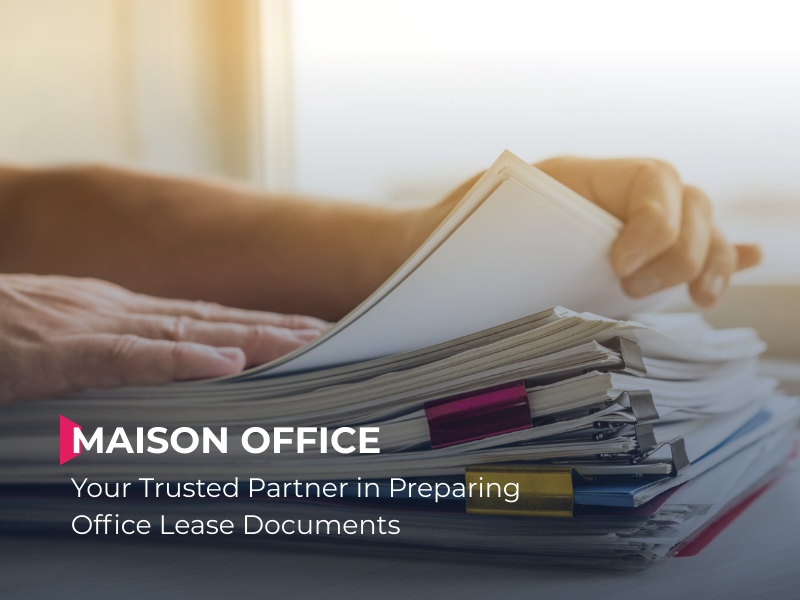
With an experienced team of consultants and legal experts, Maison Office ensures a smooth, transparent, and legally sound leasing process – minimizing risks and saving valuable time for your business. Whether you are setting up a new office, relocating, or expanding operations, we are committed to delivering end-to-end support tailored to your needs.
Maison Office not only assists in preparing legal documents but also offers strategic advice on choosing office locations that fit your industry and business size. With a database of over 2,000 buildings in central districts of Hanoi and Ho Chi Minh City, we help clients quickly access and find the perfect office for their needs. Additionally, Maison Office also supports clients in negotiating contract terms to ensure clear rights and responsibilities between parties.
Contact us now for a free consultation. Let Maison Office be your trusted partner for every step of your business growth in Vietnam!
>> See more: How to Set Up a Company in Vietnam – A Complete Guide

Editor and content team manager at Maison Office.
With over 5 years of experience in consulting and extensive content editing in the real estate services and interior design field. Sharing valuable information with customers, partners, and attracting millions of views.



